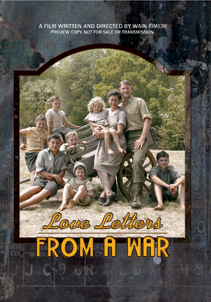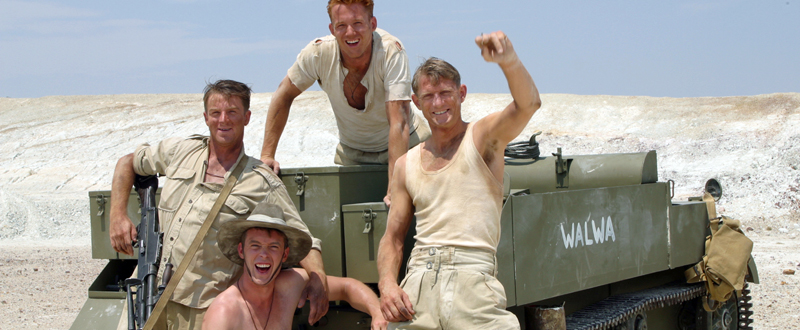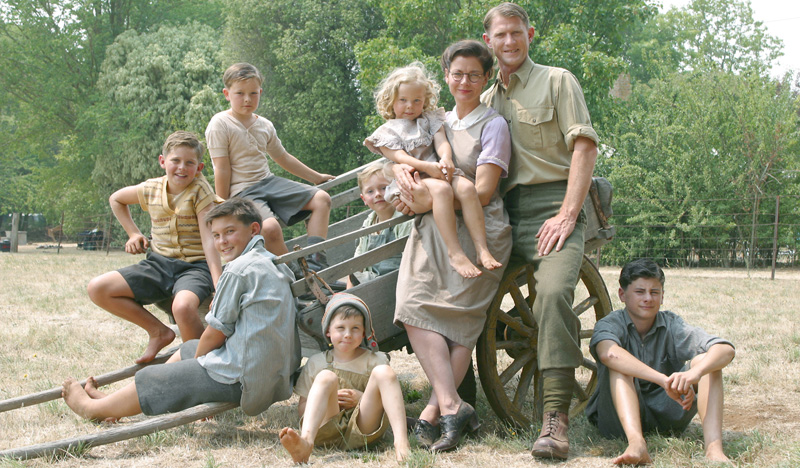
Love Letters From a War
Writer Director — 1 Hour Television Feature
John and Josie Johnson adore each other. They’re about as poor as you can get. They have eight kids. The eldest is fifteen, the youngest is a baby John's never seen. She's born while he's fighting in the Second world war. They seemed to write to each other every day. A true story.
‘This stunning documentary is illuminating and devastating.’ — Sydney Morning Herald
‘One of the most touching love stories you're likely to see on television, exquisitely presented through a combination of archival footage and re-created events seamlessly to create a vivid, moving portrait of an era.’ — The Advertiser
In 1924, twenty-two year old John Johnson meets Josephine Duggan. She’s seventeen years old and works a shirt presser at the Pelaco factory in Melbourne. For both, it is their first and only love. Both their parents oppose marriage because John is Anglican and Josie is Catholic, so they decide to get pregnant and force everyone to change their minds. Seven months after they marry, their first son Jack is born.
They lose everything in the crash of 1929. They pack what’s left into a Model-T Ford and move to Walwa, a small town on the Murray River. By 1939 they have seven kids. They live in a three-roomed timber cottage. There’s no hot water. No electricity. No bathroom. For milk, they keep a cow. The kids carry their shoes to school. It makes the shoes last longer. They live on rabbits and golden syrup pudding. Josie knows a hundred recipes for rabbit.
In 1939 John volunteers for the army. From that moment till he finds himself in North Africa, we have all of John’s and Josie’s letters and those of the kids. It might be a unique record.
‘This is simply a brilliant program in terms of both its story and the way in which it is told. Recreated using archival footage and re enactments seamlessly cut together, and as a love story, it is inspirational.’ — Courier Mail

‘It's a simple spare story told with extraordinary affection. At its heart is the written word, preserved and cherished.’ — The Bulletin
There are a zillion letters in wartime, but very few collections from both parties. There’s one big reason for this. The soldier’s letters were exotic. They had a home. A drawer. A cupboard. A shoebox. For the soldier in the field, keeping letters was harder. They were forced by circumstance to discard or lose letters. Sometimes they simply couldn’t carry another ounce of weight. Their letters rarely came home and joined the narrative accumulating in the shoebox. So when I found the Johnson letters, I realised they’re a rare and wonderful record of a large family in a small country town at the tail end of the Great Depression, a personal account of the war in North Africa, and a beautiful, tragic love story. All of the dialogue from the film is taken from these letters.
‘A uniquely Australian tale of enduring passion, this beautifully blended part documentary, part drama, told with such gentle poignancy that it will linger with you for some time after.’ — Advertiser

‘This is a love story of heartbreaking intensity. A docu-drama drawn largely from letters exchanged during World War II by John and Josie Johnson, the screenplay traces the lives of this couple who meet, fall deeply in love and are devoted to each other and their eight children, but who are then separated by war when John joins the army and finds himself at Tobruk. The letters are their only link, often taking months to arrive. It is not only the family which is vividly recreated here, the screenplay captures time and place in the minutiae of rural and domestic life and John's experiences in the army. The letters are candid, full of feeling, humour and incidental detail, but it is Wain Fimeri's command of story-telling that draws them together to create an absorbing narrative that is passionate while never descending into mawkishness or sentimentality. It is about war and its impact: love, loss and grief experienced at a deeply personal level, as well as at the level of a community, and a country still in the process of finding an identity. It is both a celebration and a work of mourning. ’ — The Village Roadshow Prize for Screen Writing

- Screened ABC TV Movie of the week all states.
- AFI Nomination - Best Direction in a Documentary
- AFI Nomination - Open Craft Award in a Non Feature Film
- Shortlisted, Village Roadshow prize for screenwriting.
- Shortlisted Victorian Premier’s Literary awards 2003
- New York Festival - World Silver Medal for docudrama Television Programming
- Gold Award, Australian Cinematographers Society, Victoria
- Shortlisted, New South Wales Premier’s Literary awards
- Gold Tripod, Australian Cinematographers Society.
